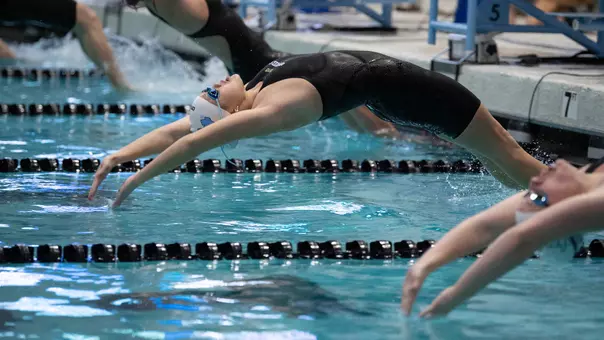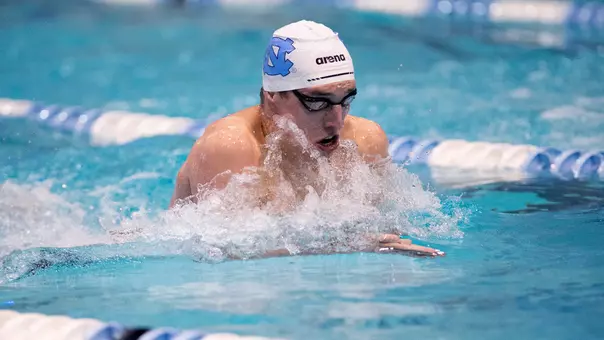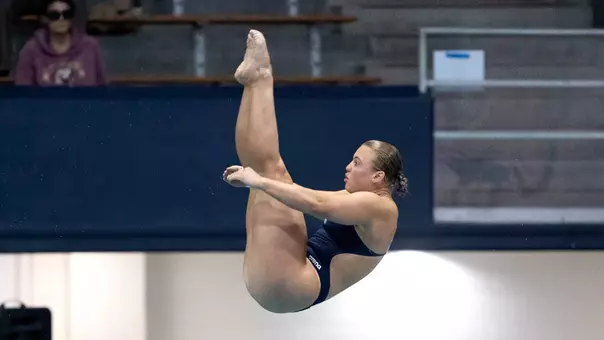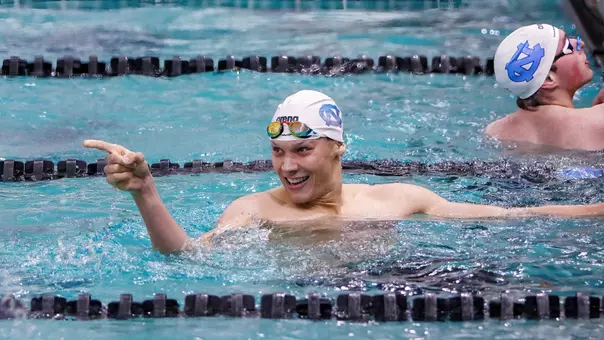University of North Carolina Athletics
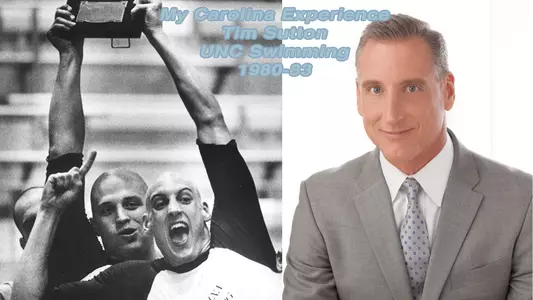
My Carolina Experience: Tim Sutton
June 24, 2015 | Swimming & Diving
My Carolina Experience: Tim Sutton
By Zoya Johnson, GoHeels.com
Tim Sutton was a talented athlete with an older brother who challenged him to be his best. As such, he earned a spot on his high school's varsity swimming team as a freshman, and did not disappoint.
In his sophomore year, all the extra-curricular sports at his high school were discontinued. Sutton joined a neighboring community's YMCA, and it was there he became a national caliber athlete
“Once sports were reinstated in Rockford my junior year, I became a conference champion and an Illinois sprint freestyle finalist. My senior year was even more successful, as I established new city and district records while earning All-State honors. It was that success on the Illinois high school stage that was a catalyst to UNC recruiting me,” says Sutton.
Even as early as the late 1970s, North Carolina had earned a reputation as a 'Public Ivy,' marking it as affordable while carrying great academic status. Thus, Sutton saw Carolina as more of a reach, than a possibility.
As his times continued to drop during his senior year, Carolina's interest in Sutton rose. Finally, a week before his high school graduation he got the call from coach Frank Comfort confirming that he had been taken off the wait list. He was officially going to be a Tar Heel.
The transition from high school star, to becoming a UNC student-athlete was one that led to many challenges for Sutton, especially as his academic goals shifted from business and law to broadcast journalism. Despite his initial struggle, he found success as he settled into a major with classes and professors he loved, and learned to lean on his new Carolina family.
As Sutton found himself in the classroom, he was also thriving in the pool and helping to establish a winning culture for the swimming and diving team.
In his senior year, Sutton was elected co-captain by his teammates. “That 1983 team enjoyed unprecedented success, chipping away at the dominance of NC State. After a 19-year ACC championship drought, our bond, effort and commitment to the Tar Heel Way produced the first of many future ACC championships for the UNC men's swimming and diving team,” says Sutton.
“While I learned to advocate for myself in the classroom and on the pool deck, I honed my ability to create consensus and good will. That still serves me today as I learned to be part of a small team that contributed to the larger community of UNC.”
In the classroom, his exposure to the Radio, Television and Motion Pictures Department was enlightening and engaging, and challenged Sutton to see broadcasting as a growth industry. “It wasn't until my junior year, my first in the School of Journalism, that sports production became a keen interest.
“I learned basic radio and television production, was exposed to the changing climate of broadcast law, and saw on the horizon a new distribution platform that was going to change, broadcast to narrow cast. Cable television was an uncharted frontier. ESPN was in its infancy and I saw an opportunity to join the sportscasting community and begin my career.
“Basketball was on its way to Dean Smith's first NCAA championship and Lawrence Taylor, Amos Lawrence, Kelvin Bryant and the UNC football team had gained Top 10 success. Both teams prompted national TV exposure for the university. With all of that, plus the new 24-hour sports network ESPN, I had several opportunities to intern. I did so for ABC Sports, Jefferson Pilot, ESPN and the other broadcast outlets televising games of the day.”
Once Sutton settled into his new found love of broadcasting, his UNC affiliation opened many doors. “The ACC was an ascendant league and a new partner with ESPN. My collegiate swimming success and growing TV experience enabled me to be hired by ABC as a production assistant at the Los Angeles Olympics in 1984. There another UNC alum, Jim Lampley ('71), was swimming's play-by-play voice. He looked out for me.”
Similar connections coupled with Sutton's hard work and vision were intrinsic in helping to conceive the most gratifying task of his professional career, launching the Big Ten Network.
“The genius and daring of the original team, BTN's resulting success, the birth of subsequent similar networks, and the competitive exposure for thousands of college student -athletes has changed the scope of college sports television and I think we knew it would, even back then.”
After the Big Ten Network's success, The PAC 12 Networks took that working IP model, perfected it, expanded it, and now utilizes the internet for production at unprecedented levels. After the PAC 12 Networks were established, Sutton was invited to learn about the changes to his team's original work and has since been asked to direct a dozen or more games a year.
Sutton's most important work, however, has come with his current job directing college football and basketball with ESPN, who has embraced that perfected IP production model.
Coming in, this young man from the Prairie Land of Lincoln had no idea the impact his Carolina experience would have on the culture of, not only his team, but on the world of collegiate sports. His time at UNC was not only fulfilling but inspiring and he credits his university with molding him into a young man ready to establish his independence, and contribute to society.
“In making the decision to attend, and ultimately graduate from UNC, incoming students should know they join a creative educational community that has unmatched reach beyond the grounds of Chapel Hill. The professional alumni networks are strong nationally and offer unlimited opportunities for North Carolina graduates,” says Sutton.
Stories like Sutton's, highlight how much a UNC degree not only challenges you and your mindset, but changes you for the better. As such, he states that utilizing your Carolina experience ensures, “Your successes will be determined by your talent and drive.”







